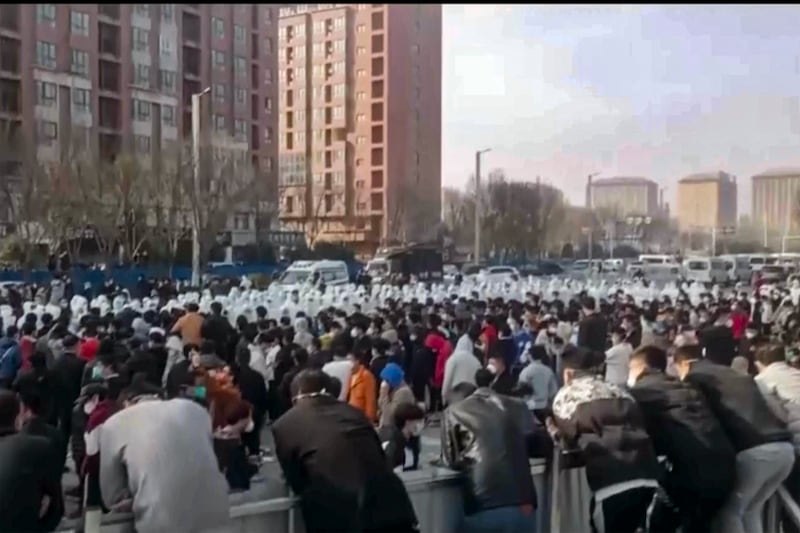Workers clashed with authorities at Taiwan-invested iPhone maker Foxconn in the central Chinese city of Zhengzhou Wednesday, as hundreds of laborers staged a protest over delayed bonus payments amid mounting anger at China’s zero-COVID policy.
Social media footage showing workers pulling down barriers and throwing them at police, smashing security cameras and fighting with authorities in white protective suits holding plastic shields, chanting "give us our pay."
Police fired tear gas and a water cannon at the crowd, prompting some of them to chant: "Here comes the tear gas! Here comes the tear gas!" while others fought back with rocks and fire extinguishers.
In one video, workers surround a vehicle, calling for "justice" at Foxconn's flagship factory, which saw a mass exodus of migrant workers amid claims of mistreatment and food shortages during a COVID-19 outbreak last month.
The Associated Press reported that a video showed that police had kicked and hit a protester with clubs after he grabbed a metal pole that had been used to strike him.
"There are so many people," one person says in a video clip uploaded to social media. "We didn't mean to cause trouble. We wanted to stand up for our rights, but they beat us ... Several people were sent to hospital from the beatings."
The factory has come to represent growing frustrations over China’s harsh zero-COVID policy that has forced residents to endure lengthy, repeated lockdowns.
Foxconn imposed a “closed-loop” system last month under which staff live and work on-site, isolated from the outside world. The system sparked anger over strict quarantine rules, poor conditions, and Foxconn’s inability to stamp out outbreaks.
Phoenix News cited a local media report saying Foxconn would give recently recruited workers who resign and return to their hometowns a subsidy of 10,000 yuan to cover salary, relocation costs and other expenses.
Before the unrest, the Zhengzhou plant employed about 200,000 people. But former workers estimate that thousands have fled the factory campus.
The protests that began Tuesday were staged by new workers hired to replace those who fled Zhengzhou, the capital of Henan province, last month.
"These Foxxconn workers are new hires from the nearby villages that the government helped to recruit,” said a resident of Zhengzhou, surnamed Li.
“The government gave each village a quota and the village cadres then helped to hire these workers. But once they arrive in the factories, the benefits are not as they were promised when they were hired. They feel they are cheated, so they want to leave,” she told RFA Mandarin.

Few Chinese media outlets have reported on the protests at the world’s largest iPhone plant.
On Tuesday, however, the Henan Daily reported that provincial Chinese Communist Party secretary Lou Yangsheng visited Foxxcon campus, urging the company to improve pandemic measures and restore normal factory operations.
Reuters news agency reported that Foxconn had aimed to resume full production at the Zhengzhou iPhone plant by the second half of November. But it quoted sources as saying the disruptions sparked by the latest unrest were likely to make the firm miss the target.
China Labour Bulletin, a Hong Kong-based advocacy group, said early this month that the conflict “has been a disaster for the Apple supplier in terms of both public relations and production, exposing the poor treatment of workers and jeopardizing supply ahead of the gift-giving holidays.”
The NGO added that “the crisis might have been averted or mitigated had the union intervened early to represent workers who voiced strong concerns that production was being put ahead of work safety.”
Translation and editing by Luisetta Mudie and Paul Eckert.
